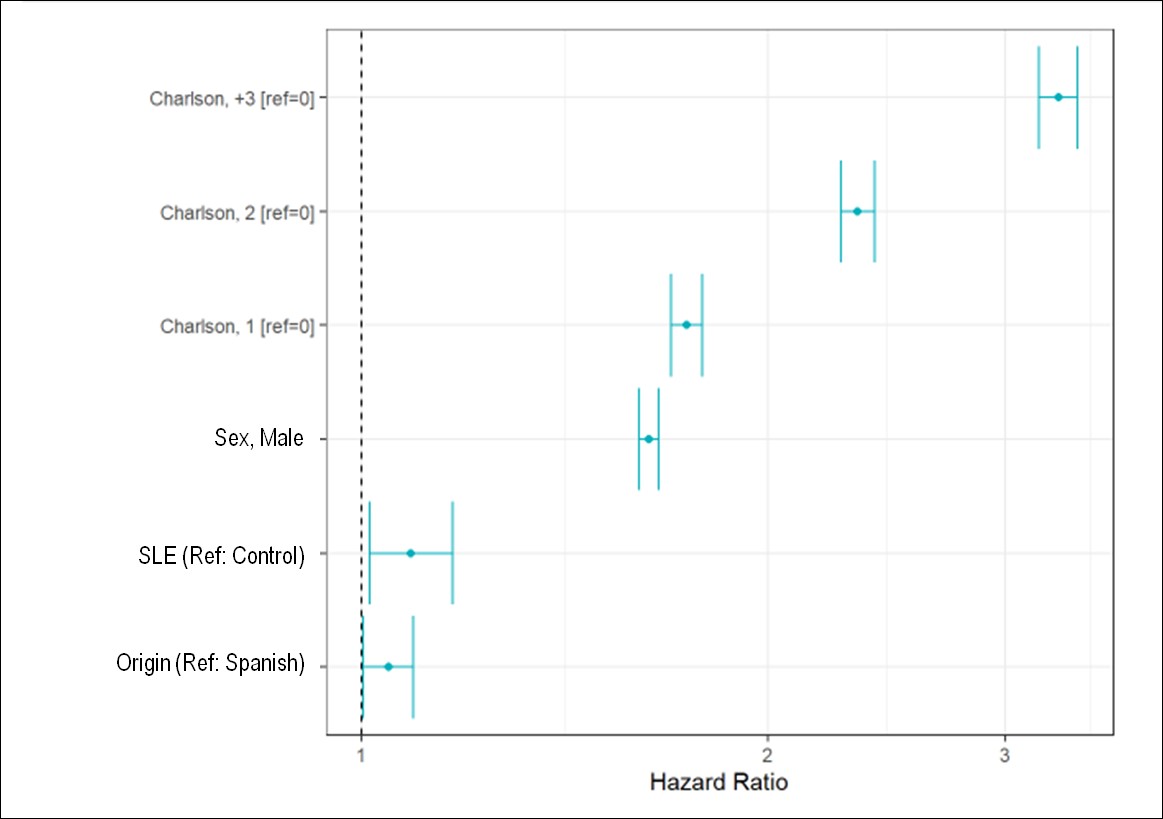Session Information
Session Type: Poster Session B
Session Time: 10:30AM-12:30PM
Background/Purpose: The differences in lupus-related mortality reported in population studies are partly explained by racial disparities and access to healthcare. However, population-based data from universal healthcare systems are less well known.Our objective was to determine factors related with mortality in SLE patients in Catalonia (Spain) during the period from January 1, 2006, and December 31, 2021.
Methods: We conducted a population-based cohort study (CAPTURED study, CatAlonia ePidemiology sTUdy in RhEumatic Diseases) of all existing Catalonian cases who received SLE diagnosis from 2006 to 2021 by using ICD-10-CM codes from the Information System for the Development of Primary Care Research (SIDIAP). A database of primary care electronic health records that includes data from 328 primary care practices covering 5.8 million people, 75% of the Catalan population.Patients with SLE were matched 1 with individuals from the Catalonia general population and estimate hazart ratio (HR) for mortality using a cox regression model adjusting by potential coufounding factors including sex, age, origin (Spanish vs non-Spanish), socioeconomic status (MEDEA*, Gotsens M et al. Accid Anal Prev. 2011 Sep;43(5):1802-10) and comorbidities (charlson score, CS).
Results: We identified 10,687 prevalent cases of SLE, with a mean age of 47.5 years (SD 16.3). Of these patients, 8,851 (83.4%) were female, and 6,885 (64.9%) had Spanish nationality. General characteristics are summarized in Table 1.During the study period, we identified 1,175 deaths among SLE cases (12.5%) and 11,499 (15.6%) among 824,028 controls. Age (HR 1.05, 95% CI 1.02–1.08), male sex (HR 1.60, 95% CI 1.58–1.63), and Charlson score (CS=1 HR 1.75, 95% CI 1.70–1.80; CS=2 HR 2.38, 95% CI 2.31–2.45; CS≥3 HR 3.50, 95% CI 3.38–3.62) were associated with increased mortality risk, while patients of Spanish origin had a lower risk of death (HR 0.94, 95% CI 0.90–0.98).After adjusting for confounding factors, patients with SLE had a slightly higher mortality rate compared to the general population (HR 1.09, 95% CI 1.01–1.17) (Figure 1).
Conclusion: In our population-based study conducted within a universal healthcare system, we observed a slight increase in mortality among patients with SLE. Socioeconomic status did not significantly impact mortality in these patients.
 Table 1. General characteristics of controls and SLE
Table 1. General characteristics of controls and SLE
.jpg) Adjusted HR for mortality in SLE in Catalonia (Spain)
Adjusted HR for mortality in SLE in Catalonia (Spain)
To cite this abstract in AMA style:
Gomez-Puerta J, Tebe C, Grau M, Frade Sosa B, Sarmiento-Monroy J, Carbonell-Abella C, Martinez-Laguna D, Corzo P, Sanmartí R, Aviña-Zubieta J. Factors Associated with Mortality in Systemic Lupus Erythematosus under a Universal Healthcare System: Results from the CAPTURED Study, a Population-Based Cohort in Catalonia, Spain [abstract]. Arthritis Rheumatol. 2025; 77 (suppl 9). https://acrabstracts.org/abstract/factors-associated-with-mortality-in-systemic-lupus-erythematosus-under-a-universal-healthcare-system-results-from-the-captured-study-a-population-based-cohort-in-catalonia-spain/. Accessed .« Back to ACR Convergence 2025
ACR Meeting Abstracts - https://acrabstracts.org/abstract/factors-associated-with-mortality-in-systemic-lupus-erythematosus-under-a-universal-healthcare-system-results-from-the-captured-study-a-population-based-cohort-in-catalonia-spain/
